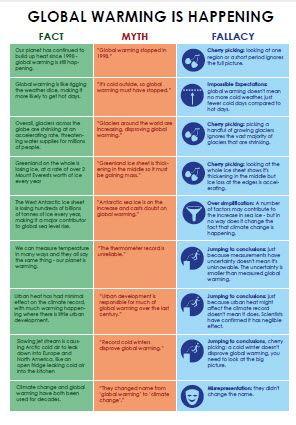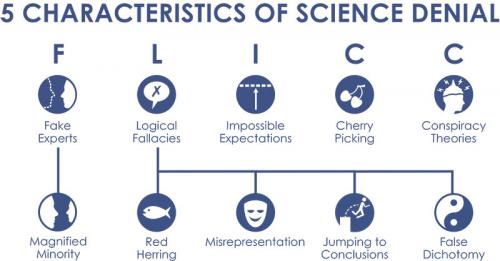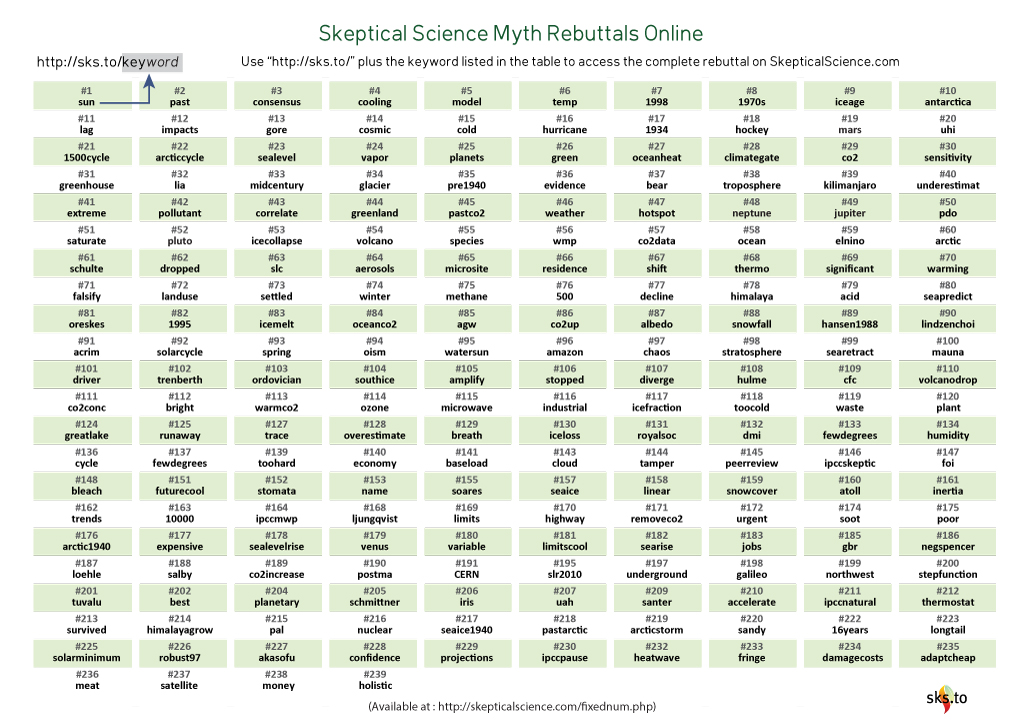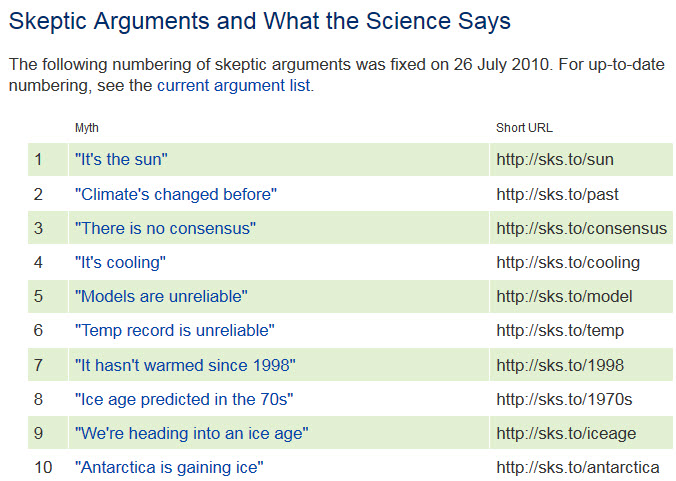Handy resources when facing a firehose of falsehoods
Posted on 3 May 2016 by BaerbelW, jg
Chances are high that you will have come across somebody somewhere on the internet who still doesn't accept the overwhelming scientific consensus on human-caused global warming. That somebody may well have used a veritable firehose of falsehoods - usually referred to as a gish-gallop - where a big list of myths is fired off in quick succession. Creating such a gish-gallop is quick & easy and the urge to try and debunk all the misinformation it contains is often quite strong, but it's also a very time-consuming task to undertake. One time-saving option to tackle it, is to just concentrate on the most egregious instances of misinformation as examples of how the writer tries to mislead his readers and to ignore the rest. But, this has the disadvantage that others might accuse you of cherry-picking what you chose to debunk.
So, what other options do you have to fairly quickly dispense with such a firehose of falsehoods?
Option #1 - The Fact-Myth-Fallacy overview
Our MOOC Denial101x debunked around 50 of the most often heard myths related to climate science using the recipe to start out with the fact, followed by a short mention of the myth (with a warning!) and finishing off with explaining the fallacy employed. A condensed version of these debunkings is available as a four-page-PDF which you can download from here:
 The fallacies are based on the five techniques used by science deniers to distort facts: fake experts, logical fallacies, impossible expectations, cherry picking evidence, and conspiracy theories. The acronym FLICC is an easy way to remember these techniques.
The fallacies are based on the five techniques used by science deniers to distort facts: fake experts, logical fallacies, impossible expectations, cherry picking evidence, and conspiracy theories. The acronym FLICC is an easy way to remember these techniques.

FLICC: Fake experts, Logical fallacies, Impossible expectations, Cherry picking, Conspiracy theories. John Cook
So, if all - or at least most - of the myths spread in the gish-gallop are listed in the fact-myth-fallacy document, you can use these condensed rebuttals for a fairly quick debunking via copying and pasting the relevant entries.
Option #2 - Referring to the fixed numbers for the rebuttals
The misinformation put forth in a typical gish-gallop usually isn't anything new under the sun and will have been repeatedly debunked already. You should therefore find it in our list of rebuttals by their fixed numbers:
For a quick debunking, just list the myths encountered by their respective number and provide the link to the list for easy reference. For a real-life example of how to employ this, check out John Mashey's review of Murry Salby's "Physics of the Atmosphere and Climate" on Amazon. Alternatively, you can also provide the fixed number together with the short URL on sites where URLs are readily accepted.
Option #3 - Play a round of "Myth Bingo"!
This could turn out to be the option with the highest fun-factor - at least for you and others playing along. After familiarising yourself at least a bit with our fixed-numbers list and the rebuttals behind it, download and print the "Myth Bingo" chart listing all the fixed-numbers and the related keywords:

Myth-Rebuttal Chart - aka "Myth Bingo" - created by jg
You can then take this with you if you for example attend a talk by a known contrarian to quickly mark the myths mentioned for later reference. Or, it can come in handy when trying to take apart a gish-gallop in the form of a YouTube video or complete film like "Swindle". Another option could be to print out copies of the matrix and hand them out to attendees asking them to just tick the myths encountered.
Please use the comments to share more ideas of where and how these resources can be used!
Note about translations:
The Fact-Myth-Fallacy quick reference is also available in German.
If you'd like to translate it into another language, please contact us by selecting "Enquiry about translations" from the contact form's dropdown menu. We'll then get in touch with additional information.































 Arguments
Arguments































I managed to silence a doubter another way, but perhaps he just avoids the subject now. He is a former team-mate of mine in Antarctica, and we are in occasional e-mail contact. Last year sometime he commented that he believed the changes in the climate were due to natural causes. I replied that he'd "been caught for a sucker" by the fossil-fuel industry. I mentioned the disinformation campaign modelled on the tobacco industry's campaign to hide the link between smoking and cancer. And this was before the revelations of Exxon's shenanigans. (Those Exxon executives can only be psycopaths.) Pointing to the latter would now be an extra weapon for us to wield.
However, I've also learned that there are psychotics in this world who refuse to accept any reality that does not fit their irrational world-view. One can do nothing about such people. They are fanatics, and one does not attempt to reason with fanatics.
In conclusion then, faced with a firehouse of falsehoods, I would ask, "So what kind of denier are you: psycopath, psychotic or sucker?" All right, it probably won't work, but it's fun to dream!
@ Digby Scorgie
I think there is a lot of merit to your post. What I have encountered almost exclusively with deniers is that their positions are politically based. That is, a conversation never goes very long without me being called a liberal an/or alarmist. The funny thing is that I am not a liberal, I'm a conservative and have been all my life (68 yrs). In fact, I was once caught up on the denial side myself, not actively, just accepting it on face value. What changed my mind was my background, a degree in Earth Science and a life-long career as a chemist. After a while, I begin hearing things in the conservative media (basic facts) that I knew were not correct. So I begin reviewing the actual scientific literature, and wow, what a wake-up call. I am so glad I had the interest and know-how to fact check, verify "openly and honestly" what was undeniabally factual, and most importantly accept those facts.
But as you suggest, some people are so caught up in their denial, they are not willing fact check, even when they have the background to do so. As an example, a couple of days ago I responded to a facebook friend concerning one of his climate denial posts. All I did was point out a few facts and made no judgements. One of his friends responded with a link to WUWT, along with a few side remarks. I responded back asking that person if they were open to checking the actual scientific literature and compariing his source with what the actual source said. The response I received was that they had a bachelors in meteorology and math and a masters in physics and that climate change was only an unproven theory or idea. I left it at that and did not respond.
The theme of my 1* review of Alex Epstein's The Moral Case for Fossil Fuels is cherry picking. It's the second most-helpful 1* review, despite the trolls.
http://smile.amazon.com/Moral-Case-Fossil-Fuels/product-reviews/1591847443/ref=cm_cr_dp_qt_hist_one?ie=UTF8&filterByStar=one_star&showViewpoints=0
RickG@2,
I know it's time consuming but did you try the debunking recepe from Cook, Lewandowsky (2011) (on the right margin) to your denier:
- start with the heading about the fact, followed by explanation of the fact,
- then a short mention of the myth,
- then explain the fallacy involved.
Last point is simple in your case, even without the details. The logical falacy of latest argument by your denier is argumentation from authority. Obviously a false authority, because a practicing meteorologist is not an expert in climate sicence.
Don't leave the denier without the response, because s/he be under impression of winning the argument which reinforces a false belief. Respond honestly with "You're wrong on it but will respond with details later" if you don't have time or patience anymore.
RickG @2
It's too late to tell your friend that he's been caught for a sucker by the psycopaths of the fossil-fuel industry. However, I'm curious to know what he would consider as "proper" evidence of global warming. In other words, if in his eyes global warming were really to occur, what would he expect to see happening around the world? I speculated on this elsewhere at this site, but was told I'd get nowhere. What do you think?
@ Digby Scorgie & chriskoz
I did not respond back due to his last comment "its only a theory or idea." That pretty much suggested to me that his "said" credentials were false, not to mention his WUWT link and not addressing my direct question asking if he had sourced the actual published paper he was trashing, which BTW was the Cook et al, 2015 Consensus paper.
I appreciate your comments and suggestions, I think I'll go back and address the specific fallacy to see what response I get back. I also like the idea of asking what evidence he would need to see in order to accept global warming. Thank you both for your input.
Sure they do. SURE they do.
[-but in reality-]
The above fallacy is detailed, here.
The Fact-Myth-Fallacy overview is a great resource. Kudos for all the work that must have gone into adhering to the F-M-F template while condensing the arguments to something that folds neatly into my pocket.
When you limit yourself to bite-size statements, pedants can quibble endlessly. I'll try not to.
But I would argue that one or two statements are untenable ("IPCC 20 times more likely to underestimate"), a couple of facts or fallacies fail to connect with the myth they're supposed to rebut (e.g. ocean acidification), and one or two others fail to dispel confusions that deniers exploit (e.g. WAIS/sea ice). And I think there's space on the "We're causing global warming" page to add a fact on the consensus!
Is this thread a good place to offer constructive criticisms? And would it serve any purpose, i.e., is there a prospect that you'll be revising this resource anytime soon?
Constructive criticism is very welcome (we'll even take destructive criticism but constructive is much more preferred :-). This thread is also a good place for your comments.
"...they had a bachelors in meteorology and math and a masters in physics"
I usually respond to that sort of argument that the molecules of CO2 don't care about your college degrees. Your opinions about liberals, taxes, Al Gore, scientists and the government mean nothing to the molecules of CO2. They just go on merrily about their business, absorbing infrared heat energy, and they are quite good at it.
The more molecules of CO2 we put into the atmosphere, the more infrared heat energy gets absorbed and the more the Earth warms up. That's really what happens regardless of how you feel about it.
OK, here are some suggestions on the Fact-Myth-Fallacy sheet. I'll start out constructive. :-)
The ocean acidification myth just argues by assertion OA "isn’t serious", which hardly merits rebuttal, but the fallacy addresses the specific myth/misunderstanding that the oceans cannot be acidifying because they’ll never become acid. I suggest that this specific claim should feature as the myth text too, otherwise this part doesn’t make sense.
There are two "models are unreliable" myths; one of these is juxtaposed with the fact that "models are based on fundamental physical principles", which is true for GCMs (though not for, say, statistical models), but doesn’t actually address reliability. I’d suggest formulating the myth here along the lines that "models aren’t reality, scientific evidence comes only from observing nature". Anoher possibility would be to merge the two myths into one.
The fact about the West Antarctic ice sheet is juxtaposed with a myth and a fallacy about Antarctic sea ice. The fallacy text fails to dispel the ice sheet/sea ice confusion exploited by deniers. It offers an accurate but weak retort that the sea-ice claim is oversimplified. Instead, it ought to call out the sea-ice argument as a red herring irrelevant to the discussion of ice-sheet mass loss and sea-level rise.
The replies to the "CO2 lagging temperature" myth are fine, but it would be good to have space to add that the present CO2 rise is entirely due to our emissions, since deniers exploit the confusion between the ice-age relationship and the modern CO2 rise to claim the latter comes from the ocean.
"Climate change is having negative impacts on all parts of society." Does this unqualified statement hold, already, everywhere? It’s good to fight cherry-picking, but it’s also fallacious to conclude from a poor cherry harvest that every individual cherry is doing badly. One alternative would be to follow AR5: "In recent decades, changes in climate have caused impacts on natural and human systems on all continents and across the oceans" (WG2 SPM). (Both statements obscure the climate justice aspect that impacts will disproportionately harm the poor.)
"Risks from extreme weather are increasing… some forms … more confidently linked to global warming than others." Should that be "some risks" or something? Some forms of extreme weather (cold extremes) are decreasing, as expected.
I have one further objection, but it'll take a little space so I'll put it in another comment.
I don't think the factsheet's claim “The IPCC is 20 times more likely to underestimate rather than exaggerate climate impacts” bears scrutiny.
Don’t get me wrong: I’m sure it’s qualitatively true that the IPCC is more likely to be over-conservative, as suggested e.g. in Brysse et al. (2013) (“erring on the side of least drama”), supported by examples e.g. in Rahmstorf et al. (2007), and practically guaranteed by the IPCC process. :-)
But “20 times” smacks of spurious quantification; at least I'm not aware of a study actually evaluating a representative sample of IPCC statements to reach such a conclusion. Apparently the source is Freudenburg and Muselli (2010), herafter FM10, discussed in the basic rebuttal to “IPCC is alarmist”. They do have a “20 times” finding, but it’s not an evaluation of IPCC findings, and doesn’t support the stated conclusion. FM10 purposely avoided drawing on the IPCC. What they did was to scan newspaper stories about new science, not evaluate the science. The most you can say, based on FM10, is that even newspapers overemphasizing scientific disagreement over climate change were much more likely to report new science as saying climate change was ’worse than expected’ than the opposite. But this may tell us more about journalistic norms for ’newsworthiness’ than about tendencies in the science, let alone the IPCC.
To the extent FM10 think otherwise (they’re not very clear), the analysis is flawed. For one thing, it falls prey to ’single-study syndrome’, since each newspaper story would likely report one new dramatic study, whereas the IPCC considers all the evidence. For another, if journalists think a good story involves ’conflict’, ’balance’ and ’danger’, these journalistic norms could well lead them to represent the science as both contested and worse than expected at the same time. Neither representation should be taken as representing the true state of the science.
However, FM10’s premise is that the newspapers’ ’worse-than-expected’ framings do reflect the tendency of the science, and even reflect it conservatively, because the papers (including WaPo and NYT) have been shown to be biased against the consensus, and so would be expected to report that the consensus view is alarmist. But when their own findings overwhelmingly contradict this assumption, does that actually confirm that the science just turned too massively gloomy for the newspapers to ignore despite their assumed bias, or does it simply mean the assumption was wrong? Anyway, their authority for this bias is Boykoff and Boykoff’s “Balance as bias” (2004), which mainly shows that the newspapers in question framed the causes of climate change (anthropogenic or natural) as still in dispute, and doesn’t really go into whether they framed the magnitude or impacts as exaggerated.